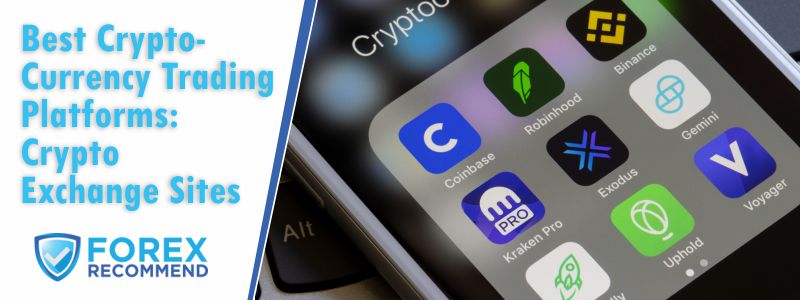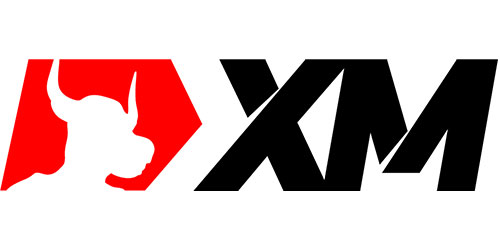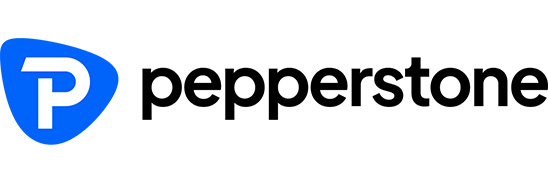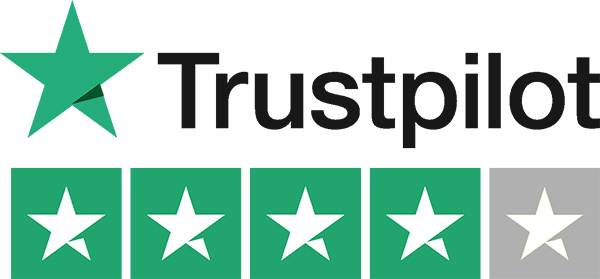
Cryptocurrency trading is increasing rapidly. With more than 12,000 cryptocurrencies in the market, investors have more options to exchange their hard-earned capital for decentralized digital money.
The perfect place for investors to do this is on cryptocurrency exchanges. Crypto exchange trading platforms facilitate the trading of cryptocurrencies for other assets, including paper money and other digital currencies.
Cryptocurrencies act as intermediaries between buyers and sellers, making their fees from commissions and transaction costs.
When investors use Crypto trading platforms, they can expect these benefits:
- Crypto platforms are user-friendly to beginner investors while catering to professional traders.
- Centralized exchanges are reliable, and they offer an additional layer of security.
Top 10 Forex Brokers Broker Rating Regulators Min Deposit Leverage Website Top 10 Forex Brokers Broker Rating Min Deposit Leverage
What are the Best Cryptocurrency Trading Platforms?
There are many cryptocurrency trading platforms in the crypto space that offer their services and solutions to investors around the world. Here are the best trading platforms to use:
- Binance
- Coinbase
- Kraken
- eToro
- Crypto.com
- Coinmama
- Bisq
- Robinhood
- TradeStation
- Gemini
1. Best exchange overall – Binance (Binance.us For USA users)
Binance is one of the most popular and largest cryptocurrency trading platforms in terms of the trading volume. Binance supports over 150 cryptocurrencies and coins, including Bitcoin, Ethereum, Litecoin, and a native BNB coin. Binance operates in the United States, Europe, Australia, and Africa.
Binance has over 100 million users and offers the following unique features:
- Uses 2FA security features, amongst other robust protocols.
- Traders can use advanced charting capabilities and technical indicators to direct their trading decisions.
- Binance is centralized, which makes it safer because the exchange controls crypto wallet keys.
- Binance offers service to over 180 countries worldwide.
- Users can pay for cryptocurrencies and sell crypto using flexible funding such as bank transfers, cryptocurrency wallets, and a credit card.
The trading fees that Binance charges will vary between categories, with the taker fee from 0.0750% to 0.0525% for 30-day trading volumes between 50 BTC to 1500 BTC.
| PROS | CONS |
| Low fees | Suitable for more advanced traders |
| A wide range of cryptocurrencies and trading pairs offered | Binance US offers fewer trading pairs than the international Binance |
| Advanced charting capabilities | Binance US does not support all states |
| 24/7 multilingual support | |
| Option to buy cryptocurrency with a credit card | |
| Comprehensive training academy |
2. Buy Bitcoin for beginners – Coinbase
Coinbase is the most popular cryptocurrency trading platform in the United States that has been operating since 2012. Coinbase is fully regulated and licensed to offer its services in the United States to more than 40 states and jurisdictions.
Coinbase offers the lowest barrier of entry into cryptocurrency markets not only to the United States but also to other countries in the world. Coinbase is easy to use, and it offers insured custodial services to all its clients.
Coinbase supports several different cryptocurrencies, and Coinbase Pro allows users to use advanced charting and technical indicators to trade crypto.
Features of Coinbase include:
- Coinbase supports Bitcoin and a wide range of other altcoins.
- Coinbase has high liquidity and trading volume, allowing traders to find their trades easily or to exchange crypto quickly.
- Coinbase is centralized and stores client funds in offline wallets.
The trading fee for Coinbase is between $0.99 and $2.99, depending on the US dollar value on the trading day.
| PROS | CONS |
| User-friendly trading platform | Demo accounts are not offered |
| A wide range of cryptocurrencies offered | Only offers cryptocurrency trading |
| Useful trading tools offered | |
| Selection of educational materials offered | |
| There is a dedicated customer service team | |
| Low minimum deposit requirement | |
| Good reputation and listed on a stock exchange | |
| Well-regulated and licensed |
3. Top Bitcoin exchange – Kraken
Kraken is a popular Bitcoin exchange trading platform that was established in 2011 and is available to 48 US states and 176 worldwide countries. Kraken supports and lists 40 different cryptocurrencies, including popular coins such as BTC.
Kraken is one of the top 10 latest cryptocurrency exchanges according to its daily trading volume, and it is considered safe because it has never been hacked.
Features of Kraken include:
- The ability to exchange fiat currencies into cryptocurrency and to exchange crypto for other cryptos.
- Low trading fees
- Kraken is secure to use
- Users can buy crypto using MasterCard, Bank Wire Transfer, and Bank Cards, among several other options.
- There is an innovative mobile trading app for smartphones.
- Provides analytical tools that help traders refine their trading decisions.
- The daily maximum trading amount is $100,000.
The trading fees that Kraken charges vary between 0.16% and 0.10% on a 30-day trading volume between $0 and $500,000. The taker fee ranges from 0.26% and 20% on a 30-day trading volume of the same amount.
| PROS | CONS |
| The sophisticated mobile trading platform offered | Unregulated |
| Selection of educational material provided | Limited non-crypto trading assets |
| 24/7 customer support | Limited starter accounts |
| Margin and leveraged trading allowed | There is a slow account funding process |
| Low trading fees charged | |
| Well-established trading platform | |
| Bi-weekly staking rewards paid to investors |
4. Crypto meets forex – eToro
eToro is one of the most reputable forex and CFD trading brokers and the leading social trading platform in the industry. eToro offers a wide range of digital assets that can be bought, sold, and exchanged on the eToro proprietary trading platform.
eToro's social trading allows users to copy the trade of expert traders that they follow directly to their accounts. This allows beginner traders to trade even if they do not have prior experience in trading.
The features that eToro offers include the following:
- The eToro trading platform supports more than 2,000 tradable instruments with 94 different cryptocurrency trading pairs.
- The eToro mobile wallet is the custodian, and it uses multi-signature technology to secure the wallet.
- eToro offers a demo account for beginners.
- The eToro platform supports 66 charting tools and technical indicators.
- eToro offers CryptoProfiles that allow crypto traders to copy the trades of advanced traders to earn a passive income.
The fees that eToro charges for trading crypto is 0.75%, with a fiat-to-crypto conversion fee of 5% and 0.1% for crypto-to-crypto exchange or conversion.
| PROS | CONS |
| Worldwide support for trading crypto | Limited options in the United States |
| Copy-trading supported for cryptocurrencies | Does not support as many crypto pairs as other exchanges |
| Low initial minimums |
5. Great sign-up bonus – Crypto.com
Crypto.com is a large and rapidly expanding cryptocurrency trading platform based in Hong Kong, offering support to the United States and other customers. Crypto.com offers access to more than 90 tokens and coins, with 50 coins to United States traders and investors.
Crypto.com offers the best sign-up bonus to new traders and offers solid return rates on crypto savings accounts.
Crypto.com offers the following features:
- Blog section provided with learning articles and trading guides.
- More than 90 currencies are supported.
- The comprehensive trading app is offered for Android and iOS.
Crypto.com charges maker fees from 0.10 to 0.04% depending on trading volumes from $0 to $200,000,001 and more. Taker fees are between 0.16% and 0.10% for the same trading volume values.
| PROS | CONS |
| Variety of coins offered | Complicated fee structure |
| Weekly interest paid on crypto savings | Desktop support not offered, only trading app support |
| Users can link their debit card to their account | No standalone tools offered |
| 24/7 customer support provided | Limited trading account options |
| Educational materials offered | |
| Proprietary trading platform provided |
6. Brokerage service for popular coins – Coinmama
Coinmama is a popular cryptocurrency trading platform that has over 2.6 million users in 188 countries worldwide. Coinmama allows users to buy ten cryptocurrencies, including Bitcoin, Ethereum, and Cardano, and to sell Bitcoin for fiat currencies, including USD, GBP, and EUR.
Coinmama is well-known for its flexible payment options and offers the following unique features:
- Coinmama supports main cryptocurrencies.
- Users can only sell Bitcoin in exchange for fiat currencies.
- Coinmama has a simple transaction flow involving buying and selling directly from the trading platform.
- Coinmama offers reduced fees when users sell through its loyalty program
- Crypto client funds are not kept by the exchange
Coinmama charges a market rate plus 2% for takes and a market rate plus 0.9% for takers. On credit/debit card transactions, there is a 5% fee, with a typical fee of 3.9% on typical purchases.
| PROS | CONS |
| Range of flexible payment methods | High transaction fees |
| Choice in popular crypto assets | There is no mobile app provided |
| Range of useful trading tools provided | Crypto-to-crypto transactions not supported |
| Educational resources offered | High minimum deposit requirement |
7. Best for privacy – Bisq
Bisq is a desktop and mobile-based application that facilitates the purchase and sale of Bitcoin in exchange for fiat currencies. Bisq works according to a peer-to-peer basis where users can send and receive crypto directly.
Features of Bisq include:
- Bisq is decentralized with no point of failure
- There is no KYC requirement when registering for an account that offers the best privacy and anonymity.
- Bisq supports mobile payment options in addition to 26 others.
Fees are pays in BTC, with makers paying 0.10% and takers paying 0.70%
| PROS | CONS |
| Decentralized and no KYC requirement | Low trading volume |
| More than 25 different payment methods | Slow trading speed |
| Mobile app support for iOS and Android | Not suited for active trading |
| Choice in crypto assets that can be traded |
8. Low-cost cryptocurrency exchange – Robinhood
Robinhood is a popular and well-known US-based trading platform that provides trading across several market assets, including cryptocurrencies. Robinhood is known for the following features:
- Commission-free trading
- Regulation with FINRA and member of SIPC.
- Web-based and mobile trading platforms offered
- Offers Level II market data from NASDAQ
- Supports the use of technical indicators and chart analysis
- Educational materials are provided through Morningstar
Robinhood does not have any maker or takers fees but charges a $5.10 fee per $1,000,000,000 when users sell crypto.
| PROS | CONS |
| Well-regulated by FINRA | US clients only |
| Member of SIPC | There is a high minimum deposit for Gold Account |
| Educational materials provided | Limited funding options |
| Level II market data provided by NASDAQ | Live chat support not offered |
| User-friendly mobile app | |
| Offers the lowest fee structure |
9. Best trading options – TradeStation
TradeStation is a well-regulated trading platform and exchange that is based in the United States, with regulation with FINRA. TradeStation is a large and reputable trading platform with a long, proven track record, offering these features:
- Automatic returns of up to 6% on cryptocurrency investments and holdings.
- Marketable orders that are executed instantly.
- Excellent range of educational materials
- Top-rated customer service options
- Commission-free trading
- No minimum account requirement
TradeStation charges a maker fee ranging from 0.3% to 0.05% on trading volumes between $0 and $1,000,000 with a taker fee of 0.3% to 0.15% on the same trading volume.
| PROS | CONS |
| Excellent customer support | Limited crypto offered |
| Proven track record in the crypto market | Low-interest rates |
| Competitive fee structure | Commission-free trading only for US clients |
| Advanced research tools offered | Commission-free trading only applies to web and mobile trading |
| Well-regulated by reputable entities | Restricted leverage |
| Powerful trading platforms | |
| Extensive education offered | |
| Free premium trader tools provided | |
| Member of the SIPC | |
| Margin and leverage trading offered up to 1:2 |
10. Best for USA crypto traders – Gemini
Gemini is a United States-based cryptocurrency exchange that was founded in 2014. Gemini is one of the largest crypto trading platforms that offers its services across six continents.
Gemini has the following distinct features:
- FDIC insurance for US deposits
- Zero publicly known large hacks
- Over 20 digital assets are offered, with 46 supported pairs
- The high trading volume of over 4,363 BTC per day
- Centralized exchange
- Offers a mobile trading app for trading
- Gemini offers custody and an OTC desk
- Free deposits and withdrawals
- Critically-acclaimed customer support
- Fiat-to-crypto onramp for beginner and experienced traders
Gemini charged a convenience fee of 0.5% in addition to transaction fees that start from $0.99 for trading volumes below $10.00 up to 1.49% for volumes over $200.00, which makes Gemini one of the most expensive trading platforms.
| PROS | CONS |
| Highly secure exchange | Limited cryptocurrencies |
| Available across over 50 countries | Low privacy |
| Fiat-to-crypto onramp provided | Complicated fee structure |
| Institutional-grade custody as well as OTC desk | Margin trading is not offered |
| Multiple trading platforms across devices | Limited funding options |
| Educational materials offered | |
| Range of trading tools offered | |
| Powerful trading solutions |
What are Crypto Trading Platforms?
A Cryptocurrency exchange trading platform is a software program that is used to match buyers and sellers. These trading platforms work in the same way that brokers facilitate trading in other assets such as forex and stocks.
These trading platforms allow investors and traders to buy and sell cryptocurrencies when they want to. The crypto exchange trading platform allows users to exchange one digital currency for another or to trade crypto for fiat currency.
It is easy to use cryptocurrency trading platforms because they have user-friendly interfaces and controls, with exchange rates that are reflective of the current market prices of digital assets.
To participate in cryptocurrency trading, users must register an account with their chosen trading platform, and once verified, they can buy, sell, and exchange crypto without any intervention from the bank, government, or any other third party.
Many cryptocurrency trading platforms have native wallets where users can store their digital currencies and crypto tokens. Without a digital wallet, users cannot store, receive, or send digital currencies.
How do Cryptocurrency Trading Platforms Work?
When trading cryptocurrencies, one of the first considerations is that there is a lack of regulation in the cryptocurrency market, which means that investors and traders must use money management and risk management tools to protect their funds.
In addition, taxation policies are being implemented that subject crypto investors and traders to capital gains tax on cryptocurrencies. Before registering with a cryptocurrency exchange, users must read the relevant terms and conditions, disclaimers, and policies to ensure that they understand how the platform works.
Cryptocurrency trading platforms have multiple purposes. They help traders convert fiat currencies into cryptocurrencies by serving as a bridge between two economies. Because fiat currency is involved, it means that trading fees and withdrawal charges may be applied.
Most of the top exchanges will offer “trading pairs” which combine major currencies with mainstream cryptocurrencies such as BTC/USD, ETH/GBP, and LTC/EUR. These trading platforms also support the buying, selling, and exchange of cryptocurrencies, which involves significantly lower transaction fees.
There are over 12,000 cryptocurrencies, and exchange trading platforms do not offer support for all these assets. In some cases, investors and traders must convert their funds into certain cryptos, such as Bitcoin, on one exchange to make a trade on another exchange to get the crypto that they want.
Many cryptocurrency exchanges, especially centralized exchanges, will require users to complete a registration process before they can start trading. There are different levels of account and identity verification depending on the exchange. Some of the most robust exchanges require identity documents, proof of residence, and even a photo of the user holding up a unique code and their identity documents.
These “Know Your Client” processes form part of the policies of the exchange, and they ensure that cryptocurrency businesses comply with anti-money laundering measures.
There are two different types of cryptocurrency trading platforms, namely a centralized and decentralized exchange.
Centralized Exchanges
Centralized exchanges are run by a profit-orientated company that earns revenue from platform fees. These exchanges hold client funds, and they are not anonymous.
Transactions are executed through certain mechanisms which are provided and approved by a central authority that oversees everyday operations such as maintenance, security, and growth.
Another feature of centralized exchanges is that they often serve as a fiat gateway that supports paper money. Centralized exchanges have high liquidity because they are more secure and trusted. However, these trading platforms are susceptible to theft, cybersecurity attacks, and server downtime because of their centralization.
Decentralized Exchanges
These exchanges provide anonymous transactions and do not rely on third-party services. With these exchanges, users are not given a native wallet, and they must procure a wallet to hold digital currencies.
Because funds are not kept on the exchange, the prices are less susceptible to price manipulation and any other fraudulent trading activity. With a decentralized exchange, trades can occur peer-to-peer between users through automated processes or smart contracts.
These exchange trading platforms do not always have a fiat gateway, which means that trading, deposits, and withdrawals can only be made in cryptocurrency. Because they do not have a single location, these trading platforms are not susceptible to theft or server downtime, but they have lower liquidity than centralized platforms.
What is the Best Strategy for Choosing Cryptocurrency Trading Platforms?
There is no single cryptocurrency trading platform that is perfect for all investors and traders. Different users will have different needs and goals that can be met by different exchanges.
The process involved with choosing the right exchange starts by determining financial goals and trading objectives. Some of the most important factors to consider when choosing cryptocurrency trading platforms are:
- Reputation
- Insurance Funds
- Accessibility
- Security
- Fees
- Asset Prices
- Coin Offering
- Education
- Liquidity
- Reputation
The reputation of a cryptocurrency trading platform is important, and it can be checked by consulting different reviews carried out on the platform. These reviews will consist of different parameters, including the overall reputation and trustworthiness of the platform.
It is also important to check whether the trading platform is legitimate by searching for any scam reports on the platform. Consult social media platforms to obtain reviews from users or ex-users.
In addition, when reviewing the trading platform, it is important to read the terms and conditions and the policies of the platform.
2. Insurance Fund
The largest and best cryptocurrency trading platforms are members of a compensation fund and will have an insurance fund in place. This means that investors have fund protection under certain conditions up to a certain amount of their initial investment.
3. Accessibility
Cryptocurrency exchanges cannot be accessed from all locations because they cater to different markets and countries. For example, China does not allow residents to trade cryptocurrencies. Therefore Cryptocurrency exchanges do not allow traders from China.
American regulation is very strict, and to offer services in the United States, cryptocurrency exchange trading platforms need the right licensing and regulation.
When selecting a cryptocurrency exchange, it is important to choose one that provides services in the user's geographical location.
4. Security
This is another important factor that will determine client fund security and encryption of user information and data. Unlike banks, cryptocurrency trading platforms do not have a central institution that holds currencies.
Unlike brokers, cryptocurrency trading platforms cannot place client funds in segregated accounts with top-tier banks. The protection system that cryptocurrency exchange trading platforms use is different from either banks or brokers.
The top-rated crypto trading platforms have the best security systems in place to protect funds, for instance, by keeping client funds in an on-exchange cold wallet that is offline and can therefore not be accessed by hackers.
Despite the level of security of the trading platform, crypto investors and traders must always remember that they are responsible for the safety of their funds.
They should not keep all their capital with an exchange or in a hot/online wallet but should only keep enough funds in such wallets to carry out transactions, keeping large sums in an offline wallet.
The exchange trading platform must provide additional security features such as two-factor authentication, PIN and Password, multi-signature technology, and biometric software on mobile trading apps.
Other security features to look out for include:
- Registry locks
- SSL integration
- End-to-end encrypted transactions
- HTTPS authentication
- Browser detection systems
- DDoS migration
- Anti-DDoS migration
5. Fees
When dealing with any intermediary that facilitates trades, it is important to consider trading and non-trading fees. Crypto trading platforms typically charge lower fees than brokers and other trade facilitators, but every trader and investor has some financial limitations that they need to consider.
Investors and traders must compare different trading platforms to find one that suits their budget.
6. Asset Prices
Different platforms will offer different asset prices, which are influenced by the geographic location of the user. For instance, platforms that are based in the United States and Europe will have greater volumes than other jurisdictions.
Discrepancies in asset prices are typically the best way to identify whether a platform experiences frequent volume loss and low liquidity.
7. Coin offering
The number of individual coins and con pairings should be considered. This will determine how many trading opportunities the investor or trader will have, as well as the liquidity of the cryptocurrency exchange.
Some of the most common cryptocurrencies include Bitcoin, Ethereum, and Litecoin, amongst several others.
8. Educational Tools
For beginners and even some advanced traders, educational materials and tools are an important factor. Educational tools are used by investors and beginners to learn about the different trading strategies that can be used, allowing them to become better traders.
9. Liquidity
Liquidity refers to how quickly cryptocurrencies can be bought or sold without it affecting the exchange rate or the market price. It is important to find out whether the crypto trading platform is liquid because it will affect pricing and trade execution speed.
You can buy cryptocurrency safely from these cryptocurrency platforms.
What is the Safest Cryptocurrency Trading Platform?
Several cryptocurrency trading platforms are safe and robust, but Coinbase is still the safest cryptocurrency trading platform in the world.
The features that make Coinbase the safest trading platform are:
- All USD deposits are insured by the Federal Deposit Insurance Corporation (FDIC) up to a maximum of $250,000.
- All digital assets on Coinbase are fully insured by an insurance policy.
- Coinbase's “Custody” addresses have strict financial controls, and there are regular audits by external firms to ensure that the highest possible standards are met.
- Coinbase stores 98% of all client funds offline.
- Coinbase runs a dedicated program called “Bug Bounty,” offering generous rewards to security researchers who identify any software security issues and vulnerabilities in the back-end of the platform.
- Coinbase has never experienced a hack.
What is the Cheapest Cryptocurrency Trading Platform?
The cheapest crypto trading platform is Robinhood because there are no trading fees, deposit fees, or withdrawal fees charged when using the trading platform.
The fees that many cryptocurrency exchanges charge are designed to encourage high-volume trading. Fees typically decrease when there are increases in the trading volumes on the exchange.
When investors and traders evaluate trading platforms, they must consider the fees that are charged. This is important because they must consider their trading and investment plan, any financial restrictions, and whether the trading app aligns with their trading and investment plan.
With lower transaction fees, traders and investors can invest and trade larger volumes for much cheaper, which ensures that the trading platform experiences consistent high liquidity, boing well for both the investor and the platform where profits are concerned.
With Robinhood, there are no commissions charged, no account opening or maintenance fees, or to deposit or withdraw funds. However, the Financial Industry Regulatory Authority (FINRA) charges the platform a fee for sell orders.
These fees are paid by customers, and Robinhood remits the fees to the applicable Self-Regulatory Organizations (SROs). In addition, FINRA must pay a regulatory transaction fee to the Securities and Exchange Commission (SEC) according to law.
This fee is $5.10 per $1,000,000,000 of principal sales, and Robinhood does not charge a fee when traders or investors have sales of $500 or less.
What is the Most Popular Cryptocurrency Platform?
Coinbase is the most popular cryptocurrency platform in the world, and it was listed on NASDAQ in April.
The reputation of any good cryptocurrency trading platform must precede it. The world of cryptocurrencies is new and still developing, there are also a lot of risks involved in trading and exchanging crypto, so it is important to consider the reputation of the cryptocurrency trading platform.
To find out what a cryptocurrency trading platform's reputation is, users can read honest reviews of existing and previous users, reputable websites that review brokers and exchange platforms, and other trusted sources.
When reading reviews on cryptocurrency trading platforms, it is important to consider that there may be biased, subjective reviews. It is important to compare different reviews and consult the overall review score to get an unbiased, objective result.
Many professional websites offer different in-depth reviews on trading platforms that can provide valuable, unbiased insights that include comprehensive breakdowns on the highlights, advantages, disadvantages, and other important components of digital currency trading platforms.
Beginners Guide For Forex Broker Trading
Table of Contents













